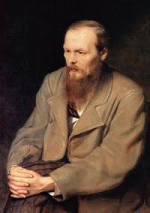Richard Pevear and Larissa Volohonsky: Russian-to-English translators turned Oprah stars

«I'm constantly surprised when I open novels by living American writers,» Richard Pevear says via telephone from his home in Paris. «They're all written in very simple, first-person, declarative style. To my ear, they have no style at all. They just put down their words on paper.»
Lest living American writers take offense, it bears keeping in mind that Pevear holds them to an especially high standard: Together with his wife, Larissa Volokhonsky, he makes his living translating books by dead Russian authors. Norman Mailer might have felt he was getting in the ring with Hemingway every time he sat down to write, but neither one would have volunteered to go up against Anton Chekhov, Nikolai Gogol or Fyodor Dostoevsky. «Dostoevsky simply had more range,» Pevear says. «There's his play with language, with voices, with complex sentences and speech. The play, reach and religious and political depth of his work is extraordinary.»
It was on Dostoevsky that Pevear and Volokhonsky cut their teeth; their translations of Crime and Punishment, The Brothers Karamazov, The Idiot, Demons and Notes From Underground have become the standard English-language texts. The couple has also translated Gogol's Dead Souls and Mikhail Bulgakov's Master and Margarita. Their new translation of Chekhov's Complete Short Novels (Everyman's Library, $23) -five lesser-known works that touch upon love, death, childhood and revolutionary politics- will be published this month.
But Pevear and Volokhonsky have received the most attention for their new translation of Leo Tolstoy's Anna Karenina, which hit the bestseller lists recently after Oprah Winfrey picked it as her book club's summer selection.
The Moscow Times called Winfrey's choice "the greatest promotion of Russian literature since Omar Sharif cantered across the steppe in a fur hat as Doctor Zhivago." And because Winfrey instructed her audience to specifically read Pevear and Volokhonsky's translation, the couple are now set to become the first English-language translators to earn a fortune for their efforts.
Winfrey herself would be pleased to learn that it was a love of Russian literature that brought Pevear and Volokhonsky together. Volokhonsky, who was born and raised in Leningrad (now St. Petersburg), first visited the United States in the early 1970s and happened across Pevear's Hudson Review article about the Soviet dissident author Andrei Sinyavsky. (A part-time academic, Pevear teaches courses in Dostoevsky and 19th and 20th century Russian writers at the American University of Paris.)
«Larissa had just helped Sinyavsky leave Russia,» Pevear recalls. «And she let me know that, while I'd said he was still in prison, he was actually in Paris. I was glad to know it.» Married 22 years ago, Pevear and Volokhonsky have raised two trilingual children and now live across the street from Samuel Beckett's old apartment. But if the couple's personal and private lives have always been intertwined, the thing they seem to have in common with the writers they've translated is a long-standing love affair with the Russian language itself.
In Russia, literary translation is viewed as an art unto itself. In English-speaking countries, it tends to be seen as a specialized, second-order occupation -as a result, good translations into English can be hard to come by and tough for even the best translators to sell. But Pevear and Volokhonsky put more care into their translations than many authors put into their own work.
First, Volokhonsky produces a rough, literal translation. Then Pevear -a Boston native who admits that his «Russian is not great»- produces a more idiomatic draft. Next, he says, «Larissa goes over it, raising questions. And then we go over it again. I produce another version, which she reads against the original. We go over it one more time, and then we read it twice more in proof.»
With Anna Karenina, the process took about a year and a half. In the case of Tolstoy's War and Peace, which Knopf is due to publish in the fall of 2007, it will take much longer -«it's four novels in one,» Pevear explains. Other upcoming projects include translations of Bulgakov's White Guard, Alexander Pushkin's collected prose, and, Pevear and Volkhonsky hope, a book or two by Chekhov's mentor, Nikolai Leskov «a great writer,» they say, «who keeps going out of print.»
Has their newfound success changed the couple? «It's beginning to sink in,» Pevear says. «But it was so unlooked for, so unexpected, that we've just gone on as if it never happened.»
Article published in Newsday



